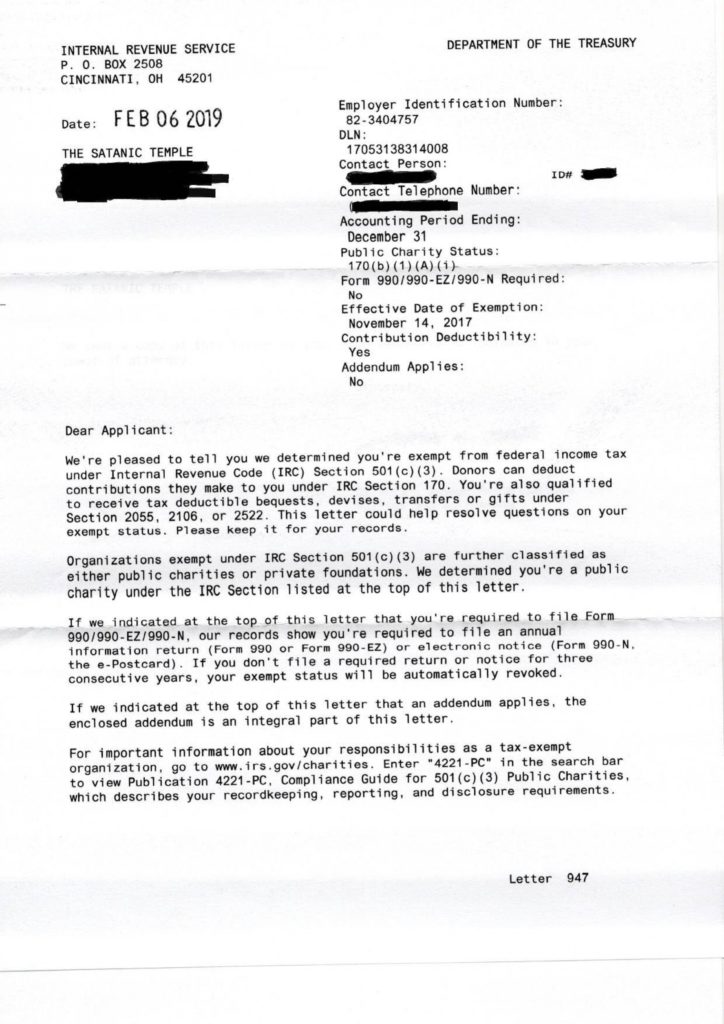The US Government Just Officially Recognized the Satanic Temple as a Religion
ANGLO AMERICA, RELIGION, 29 Jul 2019
Matthew Bell | PRI – TRANSCEND Media Service
- The Satanic Temple has earned the same tax-exempt status as a church by the IRS.
- The Satanic Temple is growing rapidly, with around 20 chapters across the US, and affiliate groups in Canada, Australia, Germany, and the UK.
- While members of the Satanic Temple see the mythological, and literary, figure of Satan as a symbol of rebellion against tyranny, they do not worship Satan in any way.
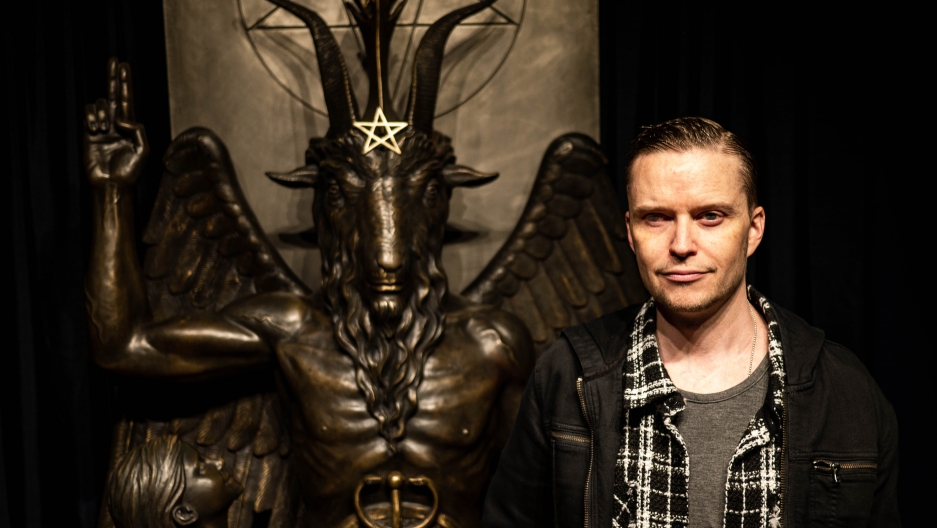
Lucien Greaves is one of the founders of The Satanic Temple. He is standing at the group’s headquarters in Salem, Massachusetts, in front of a bronze statue that the group commissioned and is fighting a court case to have placed on the grounds of the Arkansas State Capitol building near a stone statue of the Ten Commandments. Matthew Bell/The World
6 May 2019 – There’s a new religion in America.
The Satanic Temple has earned the same tax-exempt status as a church by the IRS. The group has been around for a half-dozen years and grabbed news attention for its political activism. But the official US government recognition and a recent documentary film are bringing a new level of attention to the group.
The Satanic Temple headquarters is a handsome, old, New England house — which was also a funeral home — in the center of Salem, Massachusetts.
Yes, that’s the same Salem where the witch trials played out.
Related: A 17th-century alleged witch inspired Margaret Atwood’s ‘The Handmaid’s Tale’
“This is our primary events room,” said Lucien Greaves, co-founder and spokesman of the Satanic Temple. “We weekly have people get together here; I guess you would say congregate.”
Greaves gives a tour of the temple building and art gallery, pointing out some of the ways that the place functions as a religious center.
Besides the gathering area, there is a small library with significant works of Satanic literature and history. A historic relic is on display. It’s a 2-foot tall monument for veterans, in the form of a metal cube with a reversed pentagram on the front and an upturned military helmet on top.
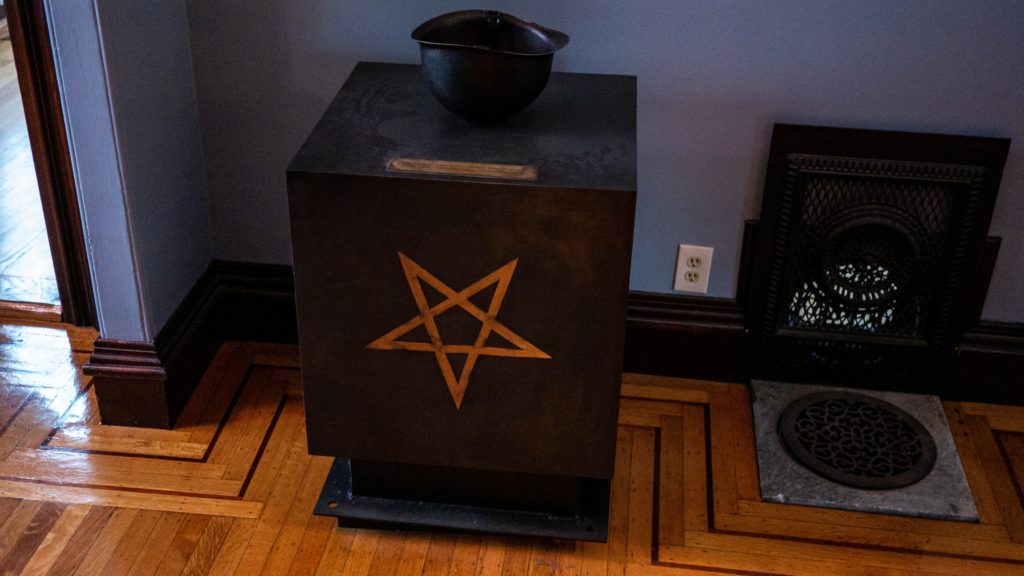
A historic relic is on display at The Satanic Temple. It’s a 2-foot tall monument for veterans, in the form of a metal cube with a reversed pentagram on the front and an upturned military helmet on top. Matthew Bell/The World
The Satanic Temple is suing the city of Belle Plain, Minnesota, for reversing a decision to install the monument in a memorial park.
The main attraction, though, is an 8-foot, 6-inch bronze statue of a goat-headed, winged icon called Baphomet. Asked if the Satanists here consider the monument to be holy, Greaves says it’s a loaded term.
Related: Atheism has been part of many Asian traditions for millennia
“Words like ‘spiritual’ or “holy,” I think — one of the first things that people need to realize about us is that we don’t advocate for any supernatural beliefs. We’re a nontheistic religion. We don’t subscribe to supernatural explanations or accept them as legitimate,” Greaves said.
He explains that while members of the Satanic Temple see the mythological, and literary, figure of Satan as a symbol of rebellion against tyranny, they do not worship Satan in any way.
“This idea of worship, it’s usually kind of insulting to people who identify with Satanism, because that implies a sense of servility. Satanism is about personal sovereignty and independence and freedom of will.”
— Lucien Greaves, co-founder, The Satanic Temple
“This idea of worship, it’s usually kind of insulting to people who identify with Satanism, because that implies a sense of servility. Satanism is about personal sovereignty and independence and freedom of will,” he said.
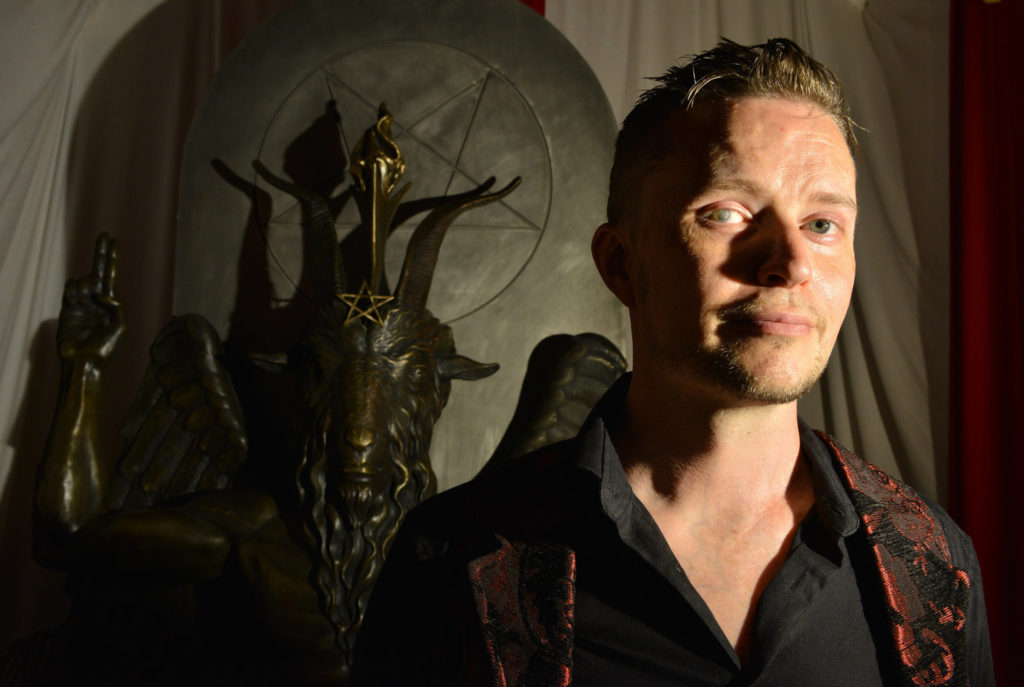
Lucien Greaves, spokesman for The Satanic Temple, with a statue of Baphomet at the group’s meeting house in Salem, MA.
Josh Reynolds for The Washington Post via Getty Images
The group is also about trolling the religious right.
“I mean, that can be part of the fun, but it’s certainly only just part of it,” Greaves said.
The trolling, the beliefs and the short history of the Satanic Temple are on vivid display in a new documentary called “Hail Satan?”
httpv://www.youtube.com/watch?v=27RtJp-rhHk
“I also assumed it was basically a joke,” said the filmmaker behind the documentary, Penny Lane.
Lane spent a few years following the founders of the Satanic Temple as they got their movement up and running with a range of public pranks, social protests and legal action, many of them centered around issues of separation of church and state. But Lane says she came away from the film believing that there is something deeper going on with the Satanic Temple — something religious.
“I had never understood why people are religious and what they get from it,” Lane said. “But it was really doing this project that made me see that religion, in and of itself, is not the problem.”
“Religion is a human impulse that has to be satisfied one way or another. We still need to come together in communities organized around values and mythology. I think the Satanic Temple is just showing me a new way.”
— Penny Lane, filmmaker
“Religion is a human impulse that has to be satisfied one way or another. We still need to come together in communities organized around values and mythology. I think the Satanic Temple is just showing me a new way.”
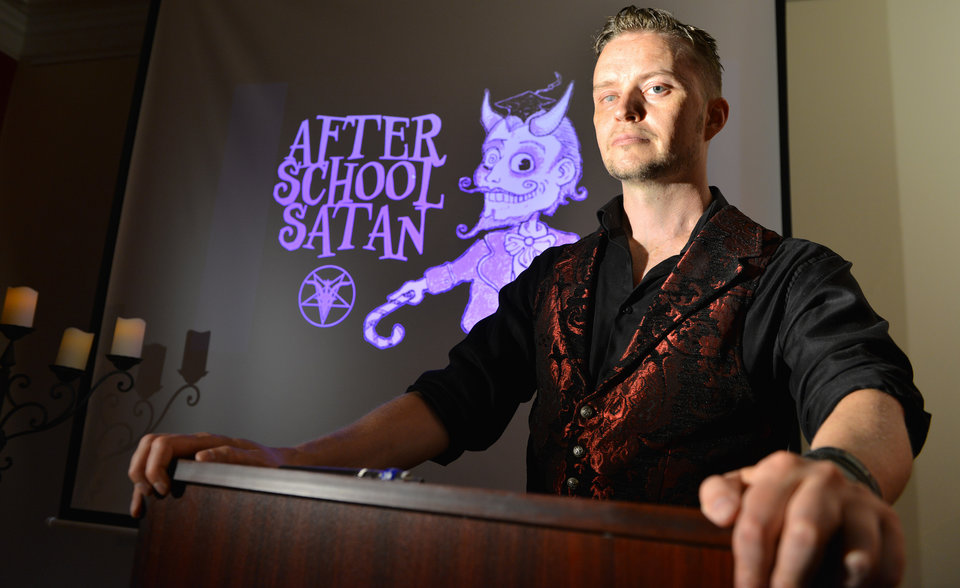
The Satanic Temple, a group of political activists who identify themselves as a religious sect, are seeking to establish After-School Satan clubs as a counterpart to fundamentalist Christian Good News Clubs.
Josh Reynolds for The Washington Post via Getty Images
But what makes a religion legitimate in the eyes of government?
Different countries handle that question differently.
In China, there are just five officially recognized religions, and they’re all overseen by the State Administration for Religious Affairs. Some Western countries have official state churches, like the Evangelical Lutheran Church of Finland and the Church of England.
The United States has no state church and no religious bureaucracy. That means it’s really up to the IRS to decide if a new entity claiming to be religious deserves tax-exempt status and the official recognition that comes with it.
Benjamin Zeller is a religion scholar at Lake Forest College. He says he was not surprised with this IRS decision. But does he think the Satanic Temple is a real religion?
“The way we tend to use the word is really based on a very sort of Protestant Christian understanding about what counts as a religion.”
— Benjamin Zeller, Lake Forest College, religion scholar
“The way we tend to use the word is really based on a very sort of Protestant Christian understanding about what counts as a religion,” Zeller said.
“We tend to think about institutions that have leaders, texts, buildings, adherents, beliefs, rituals. The Satanic Temple actually checks those boxes, at least most of them. We may not like it. We may not think of it as a conventional religion, but it seems to fit the characteristics.”
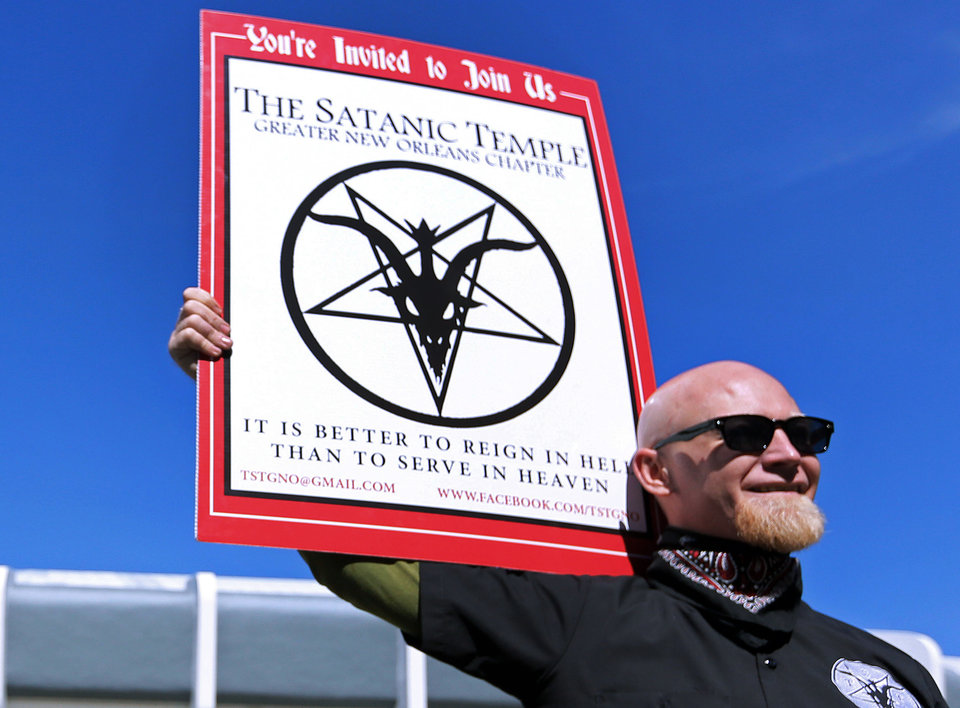
Chris Bridges holds a sign for The Satanic Temple during a protest outside of an all-day prayer rally. Associated Press/Jonathan Bachman
Thanks in part to the IRS decision and the new documentary, the Satanic Temple is entering a phase of rapid growth. It’s got something like 20 chapters across the US, and affiliate groups in Canada, Australia, Germany and the UK, with more seeking approval from the Satanic Temple.
Co-founder Lucien Greaves also gives credit for this to some of his biggest critics.
“In a way, the Satanic Temple has enjoyed such expansive, explosive growth because of the rise of the theocratic right in the United States. Our expansive membership numbers are a response to the Trump administration and Pence being vice president. People are horrified.”
— Lucien Greaves, co-founder, The Satanic Temple
“In a way, the Satanic Temple has enjoyed such expansive, explosive growth because of the rise of the theocratic right in the United States,” he said. “Our expansive membership numbers are a response to the Trump administration and Pence being vice president. People are horrified.”
The core beliefs of the Satanic Temple are laid out in its so-called seven tenets. They mention personal freedom, including the freedom to offend, the pursuit of justice and the value of scientific understanding. Tenet No. 1 reads, “Strive to act with compassion and empathy toward all creatures in accordance with reason.”
Greaves says the group is serious about nonviolence. Maintaining ideological consistency could be a challenge the organization faces right now as it grows quickly.
“We’re to the point now where we’re already big enough and our message has resonated with people strongly enough that we’ve developed schisms, and people disagree with some of our tactics with how we approach injustice and other types of activism.”
No spoiler here, but there’s an episode that plays out in the “Hail Satan?” film, when one of the group’s leaders does something that crosses the line in the view of some other leaders. Greaves needs to make a difficult decision.
It’s the sort of problem comes with the territory, as the Satanic Temple evolves from being a small band of pranksters into something more like an established religious organization.
Tags: Religion, Satanism
DISCLAIMER: The statements, views and opinions expressed in pieces republished here are solely those of the authors and do not necessarily represent those of TMS. In accordance with title 17 U.S.C. section 107, this material is distributed without profit to those who have expressed a prior interest in receiving the included information for research and educational purposes. TMS has no affiliation whatsoever with the originator of this article nor is TMS endorsed or sponsored by the originator. “GO TO ORIGINAL” links are provided as a convenience to our readers and allow for verification of authenticity. However, as originating pages are often updated by their originating host sites, the versions posted may not match the versions our readers view when clicking the “GO TO ORIGINAL” links. This site contains copyrighted material the use of which has not always been specifically authorized by the copyright owner. We are making such material available in our efforts to advance understanding of environmental, political, human rights, economic, democracy, scientific, and social justice issues, etc. We believe this constitutes a ‘fair use’ of any such copyrighted material as provided for in section 107 of the US Copyright Law. In accordance with Title 17 U.S.C. Section 107, the material on this site is distributed without profit to those who have expressed a prior interest in receiving the included information for research and educational purposes. For more information go to: http://www.law.cornell.edu/uscode/17/107.shtml. If you wish to use copyrighted material from this site for purposes of your own that go beyond ‘fair use’, you must obtain permission from the copyright owner.
Read more
Click here to go to the current weekly digest or pick another article:
ANGLO AMERICA:
RELIGION:
